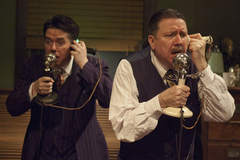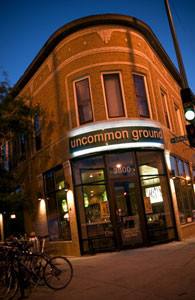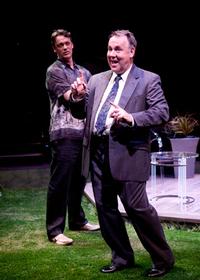“Literature is the art of writing something that will be read twice; journalism what will be grasped at once, and they require separate techniques.”
Cyril Connolly, Enemies of Promise
TT: Snapshot
Benno Moiseiwitsch plays Franz Liszt’s transcription of Wagner’s Tannhauser Overture:
(This is the latest in a weekly series of arts-related videos that appear in this space each Wednesday.)
TT: Almanac
“To make progress, you have to make a mess.”
Peggy Lee (quoted in George Simon, “Hooray for Love!,” Metronome, December 1948)
TT: Almanac
“I always felt that people who are really stars, they have a secret.”
Marge Champion (quoted in Peter Richmond, Fever: The Life and Music of Miss Peggy Lee)
TT: If it’s Monday, I don’t know where we are
Depending on when you get around to reading these words, Mrs. T and I will either be in Chicago, in Washington, D.C., or somewhere in between. We’re flying to Washington this afternoon to see Stephen Sondheim’s Follies at the Kennedy Center on Tuesday and the Shakespeare Theatre Company’s production of Harold Pinter’s Old Times on Thursday, and I plan to spend my afternoons rooting around in the Smithsonian Institution’s Duke Ellington Collection. I’ll also be knocking out a couple of columns in our hotel room when not otherwise occupied.
 This is not, in other words, a vacation, though our travels very often have a carefree air, mainly because we spend so much time seeing plays and musicals. We saw, for instance, three shows in Chicago and its environs over the weekend, The Front Page, Porgy and Bess, and Heartbreak House, about which I’ll be saying my say in The Wall Street Journal starting on Friday. It happens that both The Front Page and Heartbreak House were performed in the round in tiny theaters, and the Court’s Porgy and Bess was a small-scale production (fifteen actors, six instrumentalists) mounted in a 250-seat house. I like a really big show as much as the next guy, but having just spent the past two months seeing virtually nothing but Broadway shows, with visits to Carnegie Hall and the New York State Theater thrown in for good measure, it was a pleasure–almost a relief–to spend the weekend in such intimate surroundings.
This is not, in other words, a vacation, though our travels very often have a carefree air, mainly because we spend so much time seeing plays and musicals. We saw, for instance, three shows in Chicago and its environs over the weekend, The Front Page, Porgy and Bess, and Heartbreak House, about which I’ll be saying my say in The Wall Street Journal starting on Friday. It happens that both The Front Page and Heartbreak House were performed in the round in tiny theaters, and the Court’s Porgy and Bess was a small-scale production (fifteen actors, six instrumentalists) mounted in a 250-seat house. I like a really big show as much as the next guy, but having just spent the past two months seeing virtually nothing but Broadway shows, with visits to Carnegie Hall and the New York State Theater thrown in for good measure, it was a pleasure–almost a relief–to spend the weekend in such intimate surroundings.
 In addition, we finally visited the fancy new modern wing of the Art Institute of Chicago, which was designed by Renzo Piano. It’s as gorgeous as you’ve heard, though I haven’t spent nearly enough time there to be able to say with confidence whether it’s a good place in which to look at art. (You have to live with a new museum building to get a clear sense of its strengths and weaknesses.) I gather that the new wing doesn’t provide the museum with a significant increase in display space, but I did encounter some paintings that were new to me on Friday, including a very late canvas by Edouard Vuillard called Vuillard’s Room at the Château des Clayes (it dates from 1932) that I can’t recall having seen hanging at the Art Institute or anywhere else.
In addition, we finally visited the fancy new modern wing of the Art Institute of Chicago, which was designed by Renzo Piano. It’s as gorgeous as you’ve heard, though I haven’t spent nearly enough time there to be able to say with confidence whether it’s a good place in which to look at art. (You have to live with a new museum building to get a clear sense of its strengths and weaknesses.) I gather that the new wing doesn’t provide the museum with a significant increase in display space, but I did encounter some paintings that were new to me on Friday, including a very late canvas by Edouard Vuillard called Vuillard’s Room at the Château des Clayes (it dates from 1932) that I can’t recall having seen hanging at the Art Institute or anywhere else.
 Our Girl in Chicago, logically enough, joined us for our wanderings through Chicagoland, and it was a joy to be with her again after a too-long separation. The three of us ate splendidly well at a pair of favorite haunts, Wrigleyville’s Uncommon Ground and Glencoe’s Prairie Grass Café. I hope we do as well for ourselves in Washington!
Our Girl in Chicago, logically enough, joined us for our wanderings through Chicagoland, and it was a joy to be with her again after a too-long separation. The three of us ate splendidly well at a pair of favorite haunts, Wrigleyville’s Uncommon Ground and Glencoe’s Prairie Grass Café. I hope we do as well for ourselves in Washington!
Mrs. T departs on Thursday, I on Friday. I’ve got things to do in Manhattan over the weekend, but on Monday I’ll rejoin her at our place in Connecticut, which I haven’t seen since we flew down to Florida in January. It’ll be nice to be in the country again, both for its own sake and because I find it easier to write there than in hotel rooms or departure lounges. I have some revisions to do on Satchmo at the Waldorf, my Louis Armstrong play, and I long to resume work on my Ellington biography. (I blush to say that it’s been on ice ever since I returned to New York in March and embarked on the Great Broadway Marathon of 2011.) Come next Saturday, though, we’ll be off and running yet again.
Such is our summer routine, and most of the time, today included, I wouldn’t have it any other way.
TT: Almanac
“If one simply wants to make a living by putting words on paper, then the BBC, the film companies and the like are reasonably helpful. But if one wants to be primarily a writer, then, in our society, one is an animal that is tolerated but not encouraged–something rather like a house sparrow–and one gets on better if one realises one’s position from the start.”
George Orwell, “The Cost of Letters” (Horizon, September 1946)
TT: Portrait of an invisible man
I began this year’s summer travels for The Wall Street Journal with a trip to San Diego, where I saw the U.S. premiere of Life of Riley, Alan Ayckbourn’s latest play. It’s terrific, and so is the production. Here’s an excerpt.
* * *
Prolific artists tend to get taken for granted. Alan Ayckbourn, for instance, has written 74 plays (with a seventy-fifth now being readied for its premiere in September). This figure, coupled with the fact that most of his plays are comedies of one sort or another, leads a great many people to wrongly suppose that he must be a lightweight. But Mr. Ayckbourn is in truth one of the half-dozen greatest living playwrights in the English-speaking world, and “Life of Riley,” his latest effort, is outstanding in every way. That it has received its U.S. premiere not on Broadway but at San Diego’s Old Globe is yet another nail in the coffin of New York’s fast-waning reputation as the vital center of theater in America.
 Though the plot of “Life of Riley” is simpler than is Mr. Ayckbourn’s wont, it contains a typical twist: The title character is neither seen nor heard, only talked about. When George Riley, a suburban schoolteacher, learns that he has a terminal illness that will kill him in a matter of months, his approaching fate becomes the subject of passionate interest to three people: Monica (Nisi Sturgis), his ex-wife, and Kathryn (Henny Russell) and Tamsin (Dana Green), two married women who have taken a more than friendly interest in him. Stir in Colin (Colin McPhillamy) and Jack (Ray Chambers), the not-at-all-complaisant husbands of Kathryn and Tamsin, and Simeon (David Bishins), the farmer with whom Monica is now living, and you’ve got a sure-fire recipe for a frenetically complicated farce.
Though the plot of “Life of Riley” is simpler than is Mr. Ayckbourn’s wont, it contains a typical twist: The title character is neither seen nor heard, only talked about. When George Riley, a suburban schoolteacher, learns that he has a terminal illness that will kill him in a matter of months, his approaching fate becomes the subject of passionate interest to three people: Monica (Nisi Sturgis), his ex-wife, and Kathryn (Henny Russell) and Tamsin (Dana Green), two married women who have taken a more than friendly interest in him. Stir in Colin (Colin McPhillamy) and Jack (Ray Chambers), the not-at-all-complaisant husbands of Kathryn and Tamsin, and Simeon (David Bishins), the farmer with whom Monica is now living, and you’ve got a sure-fire recipe for a frenetically complicated farce.
That, however, is where things start to get really interesting, for Mr. Ayckbourn specializes in sad comedies whose laughter is tinged with regret, and “Life of Riley,” like “The Norman Conquests” before it, is not a standard-issue farce but a darkly shadowed portrait of three middle-class marriages that have been steeped in the sour brine of chronic disappointment….
American directors and actors sometimes make the mistake of overegging Mr. Ayckbourn’s comic puddings, trolling for easy laughs instead of playing his scripts straight down the middle and letting the audience draw its own conclusions. Not so Richard Seer, who has staged “Life of Riley” with particular subtlety, striking an impeccable balance between cleverness and seriousness. As usual, the Old Globe has fielded an exceptional cast, only one of whose members, surprisingly enough, is English. (All praise to Jan Gist, the dialect coach, who has evidently done yeoman service.) Mr. McPhillamy, the lone Englishman, is ideal as the latest in Mr. Ayckbourn’s long line of unhappily oblivious husbands of a certain age…
* * *
Read the whole thing here.
TT: Almanac
“It seems to me that a prig is someone who judges people by his own, rather than by their, standards; criticism only becomes useful when it can show people where their own principles are in conflict.”
Evelyn Waugh, Remote People
